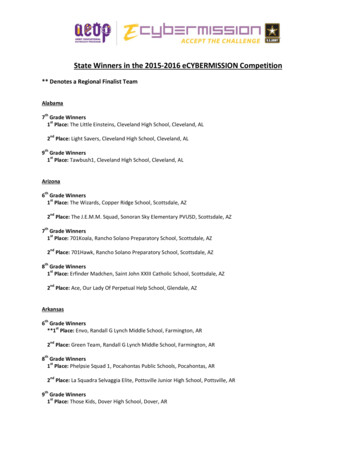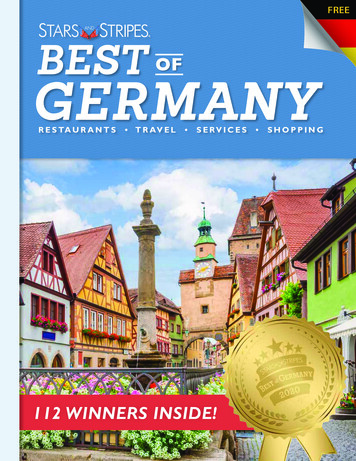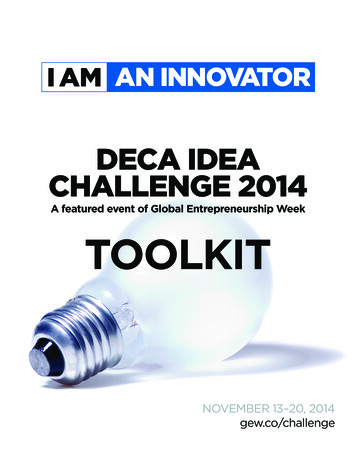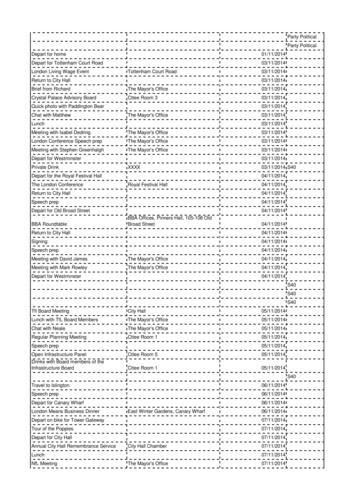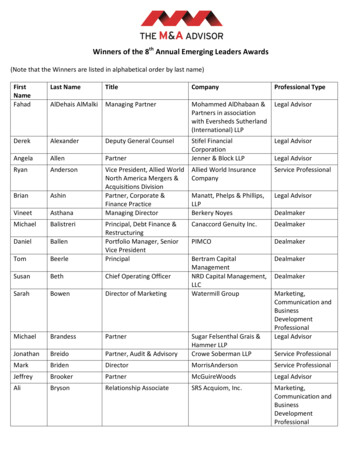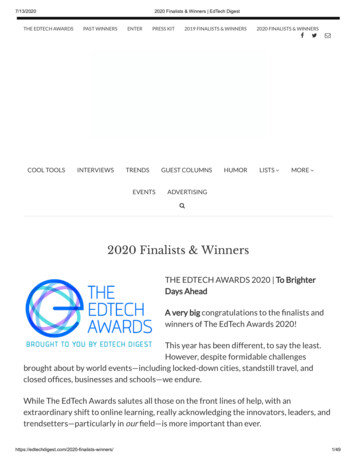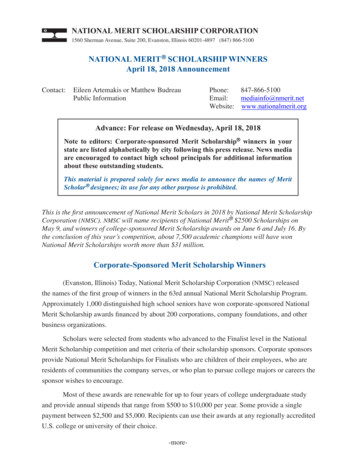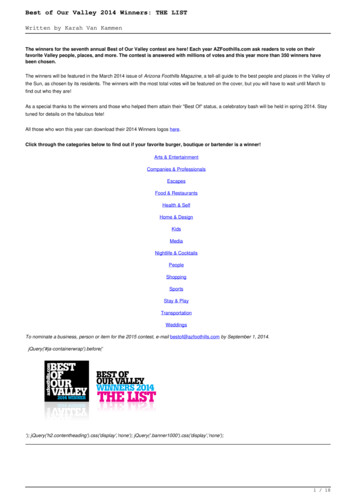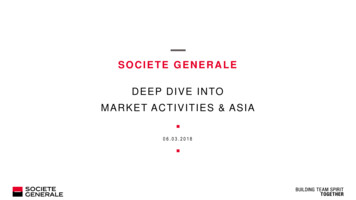
Transcription
Centers for Global Advancement and International Affairs(GAIA Centers)Rutgers, The State University of New Jersey30 College AvenueNew Brunswick, NJ 08901info@gaiacenters.rutgers.eduPhone: 848-932-1777Fax: 732-932-1979http://global.rutgers.eduWinners of the 2014-2015 GAIA GrantsInternationalizing the Curriculum Kay Cassell, Department of Library and Information Science, School of Communication andInformation, Rutgers University–New BrunswickExpanding our Students' International Knowledge and Experience Mary Curran, Graduate School of Education, Rutgers University–New BrunswickGlobal Diversity at the Graduate School of Education Kyle Farmbry, The Graduate School–Newark, Rutgers University–NewarkExpanding International Opportunities in Graduate Education at Rutgers University-Newark Jeff Friedman, Department of Dance, Mason Gross School of the ArtsInternationalizing the Dance Curriculum Richard Ludescher, School of Environmental and Biological Sciences, Rutgers University–NewBrunswickPathways to International Study at the School of Environmental and Biological Sciences Suzanne Willard, Rutgers School of Nursing, Rutgers Biomedical and Health SciencesPreparing Nurses for a Global Future2
International Collaborative Research for Tenure-Track Faculty Edward Alessi, School of Social Work, Rutgers University–NewarkStress, Mental Health, and Resilience among LGBT Forced Migrants in the US and CanadaThis study will use qualitative methods to explore the experiences of lesbian, gay, bisexual, andtransgender (LGBT) forced migrants (immigration and resettlement, mental health, victimization,and resilience) living in the United States and Canada. Thirty in-depth qualitative interviews will beconducted with individuals who fled their home countries to avoid persecution based on sexualorientation or gender identity. This study furthers the goals of the International CollaborativeResearch Grant program by fostering a partnership between Rutgers and McGill University. Thispartnership will (a) raise global awareness of the extreme human rights violations against LGBTindividuals and (b) improve mental health and social service delivery by offering empiricallysupported recommendations to North American organizations serving LGBT forced migrants. Datafrom this study will be used to obtain external funding to develop and test a counseling interventionthat reduces psychological distress, improve coping skills, and promotes resilience in LGBT forcedmigrants. Maureen Donaghy, Department of Public Affairs and Administration, Camden College of Arts andSciences, Rutgers University–CamdenUrban Politics in Brazil: Removals and Resistance in Foz de IguaçuThis proposal is to establish a new partnership between Rutgers University and the Federal Universityfor Latin American Integration (UNILA). Dr. Maureen Donaghy from the Departments of PoliticalScience and Public Policy and Administration at Rutgers-Camden will participate in a research studywith faculty from UNILA, led by Dr.Cecilia de Morais Machado. The study assesses the social impactof large-scale development projects in the city of Foz de Iguaçu, located on the border ofBrazil,Argentina, and Paraguay. Our goal is to analyze this case in the context of on-going work bythe researchers and other scholars working in the network of the Observatoryof Removals, based in São Paulo, Brazil. In the city of Foz de Iguaçu approximately 30 large-scaledevelopment projects are planned for the coming years, which is significant given the small size ofthe city. The city represents a contrasting case to Sao Paulo because of its unique position on thefrontier of three nations. Asher Ghertner, Department of Geography, School of Arts and Sciences, Rutgers University–NewBrunswickThe Anatomy of a Suburb: Informal Urbanism in Delhi and MumbaiThis project brings leading urban scholars from Rutgers and the School of Habitat Studies at the TataInstitute of Social Sciences in Mumbai together to form an urban research network and to carry out3
two months of collaborative field research on processes of informal suburbanization in Delhi andMumbai. The research focuses in vernacular forms of property development and how they tie intoand draw upon regional, national and global flows of real estate investment and political patronage.The project will involve one Rutgers PhD student and at least three TISS Masters students and willinclude two workshops on urban informality that will engage wider audiences, one to take place atTISS and one at Rutgers, New Brunswick. The project builds on already existing research ties betweenRutgers and TISS, and moves Rutgers one step closer to an official MOU with this leading socialscience university. The Rutgers workshop further promises to align with the 2015-2016 GAIA BiennialTheme on Global Urbanism. Heidi Hausermann, Department of Human Ecology, School of Environmental and BiologicalSciences, Rutgers University–New BrunswickProducing Disease in Commodity Landscapes: A Pilot Study from Ghana's Alluvial Gold Mining BeltThis pilot study examines new health concerns in landscapes transformed by commodity productionin Ghana. Our broad hypothesis is rural communities are experiencing increases in malaria,onchoceriasis, and gastrointestinal illnesses due to landscape and hydrological changes fromunregulated gold mining. Moreover, we expect to see differentiated vulnerabilities withincommunities as certain people- for instance, lowest income households and those who collect water– are particularly susceptible to illnesses based on factors and behaviors associated with age,gender, resource availability, etc. We employ a mixed-methods and interdisciplinary approach in thispilot study, which will result in preliminary data and identification of additional field sties. Thisinformation will enable development of a larger proposal for external funding that employs acomparative case study approach. Finally, this project will formalize and strengthen interdisciplinarycollaborations between the University of Mines and Technology and Rutgers University, and explicitlyengages undergraduates and community members as research collaborators. Qingyu Meng, School of Public Health, Rutgers Biomedical and Health SciencesAir Pollution Campaign in UgandaAir pollution exposure increases the susceptibility to Mycobacterium tuberculosis (M.tb) and maymodify the course of HIV infection. We have been the first to publish air quality data from Kampala(Uganda’s capital city) in 2014 and air quality monitoring systems have been unavailable to date.This pilot project will allow us to expand our air pollution work in Kampala and supports thedevelopment with local community leader’s of culturally customized intervention approaches for airpollution exposure reduction as suggested by the Environmental Protection Agencies (EPA) for theUS. The GAIA project also supports exploration in the laboratory of the impact of PM2.5 (fine airparticulate matter) on cells infected with M.tb and HIV. With GAIA project funds we will be able toaddress several highly relevant public health problems in Uganda using a multidisciplinary approach.The GAIA project will also strengthen existing collaborations between Rutgers and MakerereUniversity in Kampala.4
Michal Szostak, Department of Chemistry, Newark College of Arts and Sciences, RutgersUniversity–NewarkNew Vistas in Catalytic Activation of Amide Bonds: Development of a General Model for AmideBond Distortion through Spectroscopic and Computational MethodsThe amide bond is one of the most fundamental functional groups in chemistry and biology. Themajor objective of this research proposal is the development of a general model for amide bonddistortion using advanced spectroscopic methods. In contrast to planar amides, very little is knownabout properties of distorted amides despite their profound implication for structure, reactivity andsignificance in biology and medicinal chemistry. At the center of this proposal is the collaborationbetween the PI at Rutgers University (Prof. Michal Szostak – an expert in the chemistry of non-planaramides) and the International Collaborator at the University of Vienna (Prof. Wolfgang Holzer – aworld-wide expert in NMR spectroscopy), which brings together the expertise of partners in syntheticorganic and analytical chemistry in a dynamic, interdisciplinary fashion. If successful, this researchwill establish new concepts for activation of amide bonds for an array of wide-ranging downstreamapplications in synthesis and drug discovery. SaunJuhi Verma, School of Management and Labor Relations, Rutgers University–New BrunswickHow Does a State Identify Citizen Need? A Case Study of Government Rationale in Social PolicyDesignMy study analyzes the relationship between social practices and nationalized regulatory mechanismsby asking: How do bureaucrat’s definitions of citizen need frame design of social policy? In an effortto modernize its social policy and welfare state, the Indian government has introduced biometric IDsto improve equity in the distribution of state resources. My mixed methods approach evaluates thesestate innovations to shed insight into unexamined process of bureaucrat’s rationale in policy design;the project will contribute to theories of state governance. As a recipient of the Fulbright NehruFellowship, the data collection will be conducted in collaboration with the Tata Institute of SocialSciences in Mumbai, India. As a premiere institute for social science theory, the university’sintellectual space will allow for knowledge sharing and a foundation for collaborative training andresearch for future projects. Additional funding is sought from the GAIA Grant for the data analysisand knowledge sharing stage of the research study.5
International Collaborative Research for Tenured Faculty Karen D’Alonzo, Rutgers School of Nursing, Rutgers Biomedical and Health SciencesThe Contribution of Acculturation Stress to Excess Risk of Obesity among Low-Income ImmigrantLatinas in the U.S.: A Bio-Behavioral Study of Allostatic Load (AL) and Coping Styles amongOaxacan ImmigrantsAlthough weight gain is common following migration to the US, obesity and obesity-related illnessesare more prevalent among Hispanics. Consistent with the biobehavioral construct of allostatic load(AL), acculturation stress is hypothesized to be a contributing factor. The proposed study willexamine the effect of acculturation stress on obesity and measures of AL among two groups ofMexican women in New Brunswick, NJ and in Oaxaca, Mexico. Subjects will complete measures ofstress and coping and will wear a Fit Bit device to track physical activity, sleep patterns and foodintake. Measures of AL will include systolic and diastolic blood pressure; BMI and waistcircumference; HgbA1C, total cholesterol, triglycerides, C-reactive protein and fibrinogen. Groupdifferences in AL will be analyzed and potentially unique predictors of elevated AL identified. Datawill be used to develop a physical activity, nutrition and acculturation stress-reducing intervention toprevent weight gain among Mexican immigrant women. Eric Lam, Department of Plant Biology and Pathology, School of Environmental and BiologicalSciences, Rutgers University–New BrunswickEnabling the Creation of a Pilot Facility for Wastewater-to-Biomass Production Pipeline in theNortheast Region of BrazilThis project will create an international team between participants from Rutgers University(the PI), the Federal University of Pernambuco of Brazil and a social company from Argentina(MamaGrande), with the common goal of developing a sustainable agricultural platform in LatinAmerica. Leveraging the recent successes demonstrated at the Totoras pilot plant of MamaGrande inArgentina, and the completion of a high fidelity genome map for duckweed generated by the Rutgersgroup, the aim of this project will focus on coordinating research and development efforts toimplement duckweed biotechnology in the Northeast region of Brazil. Funds requested here willjump-start collaborations between the labs of the PI and Dr. Calsa's in Brazil. Also, the PI and anAgricultural Economist from Rutgers, Dr. Gal Hochman, will participate in a retreat at Recife, Brazil,that will pave the way for attracting public and private funding to implement the technology inPernambuco. Robin Leichenko, Department of Geography, School of Arts and Sciences Rutgers University–NewBrunswickQuantum Leap: Climate Change and Social Transformation6
This international collaborative project addresses the overarching question of how society canconsciously transform at the rate, scale and extent required according to current scientificunderstandings of climate change and it’s observed and expected impacts on social-ecologicalsystems. Drawing upon developments in quantum social theory, the Quantum Leap project willutilize qualitative and quantitative methods to investigate the role of collaborative power as acatalyst for generating conscious social transformations and systems change. GAIA funds willsupport: 1) participation of Leichenko and two Rutgers PhD students in a project planning workshopheld at the University of Oslo (workshop to be funded by the University of Oslo,Office of the Rector); and 2) convening of a Rutgers workshop on climate change and socialtransformation. Additional outcomes of the project include development of a larger proposal to besubmitted to the European Research Council and development of a special journal issue. Gaetano Montelione, Center for Advanced Biotechnology and Medicine, Rutgers Biomedical andHealth SciencesInternational Collaborative Research Project in Protein Dynamics and Industrial EnzymeEngineeringThe Center for Advanced Biotechnology and Medicine and the Key Laboratory for Biotechnology inJiangnan University, Wuxi, china have developed a collaborative research program to study proteinstructure and dynamics, providing the basis for enzyme engineering. The focus of the research is tounderstand the structural and dynamic underpinnings of the mechanisms of action of importantindustrial enzymes. These include Rhyzopus chinensis lipase (RCL) and various carbonyl reductasesisolated from fungi, including Candida parapsilosis SCR and RCR enzymes. A key hypothesis to betested is that the internal dynamics in these enzymes determine their rates of catalysis andstereoselectivity. Nuclear magnetic resonance (NMR) studies, using advanced software developed atRutgers, will complement enzymology, mutagenesis, and molecular modeling studies at JiangnanUniversity, in order to better understand enzymatic mechanism and deisgn new proteins withimproved properties as industrial enzymes. Rutgers undergraduates will address some of theseproblems as independent research projects. Judy Postmus, School of Social Work, Rutgers University–New BrunswickEconomic Empowerment of Domestic Violence Survivors in Australia: A Collaborative ResearchProject between Rutgers University, Curtin University, & University of New South WalesWith economic concerns listed as the top barrier to leaving the abuser, domestic violence survivorsare one of the many groups in need of economic empowerment programs. An evaluation of one suchprogram, using a randomized controlled study design, demonstrated that while both groupsexperienced improvements over time, women in the treatment group had significantly betteroutcomes on all measures immediately after and lasting twelve months. This project intends to buildon this study by replicating it in Australia. The project includes developing an Advisory Committee(AC) which brings together the co-PIs with domestic violence, government, and nongovernmentorganizations. The AC will review and revise the research methods from the previous project to make7
them more culturally applicable for women from Australia. The AC will then apply for funding toimplement the study from the Australian Research Council and the Australian National ResearchOrganization for Women’s Safety. Daniel Shain, Department of Biology, Camden College of Arts and Sciences, Rutgers University–CamdenBioenergetics of Cold-Adapted Icelandic FaunaAll life on Earth is fundamentally similar, yet even closely related organisms can occupy extremelydifferent habitats. For example, similar bacteria thrive in environments ranging from the humangastrointestinal tract to glacier ice and thermal hot springs. This study aims to identify geneticdifferences between related organisms that have independently adapted to cold temperature indistinct geographic regions, namely North America and Iceland. We have shown previously thatenergy metabolism is a critical component of cold temperature adaptation and our focus here will becomparing specific genes and gene pathways known to regulate energy production. Collectively,these analyses will help to identify underlying mechanisms and evolutionary strategies to cope withcold temperature, yielding translatable information for developing cold tolerant crops, enzymes forindustrial/food processing, and human organ storage. Ian Watson, Department of Arts, Culture and Media, Newark College of Arts and Sciences, RutgersUniversity–NewarkThe Global Urban Civic Initiative: Research and Internationalizing the CurriculumThe Department of Arts, Culture and Media Rutgers University-Newark (RU-N) proposes theexpanding the international dimension of the Urban Civic Initiative it is launching this January withthe support of a Chancellor’s Initiative grant. The proposed expansion is an internationalcollaborative research component involving faculty from three institutions: Warsaw University; TheUniversity of Dar es salaam, Tanzania; and the RU-N. The collaborative research will do three things:a. Compare, contrast and synthesize the research, teaching, and application of the arts andcreative media as generators of social change in an educational setting at the threeinstitutions;b. Produce collaborative articles on the findings to be published in major internationaljournals;c. Develop a more internationalized collaboratively curriculum in ACM (and possibly atpartner institutions) that synthesizes the best pedagogical strategies and applications ofengaging arts and creative media as generators of social change at the three partnersites.8
Faculty and Graduate Student Interdisciplinary Working Groups in Global Urbanism Zaire Dinzey-Flores, Department of Latino and Hispanic Caribbean Studies and the Department ofSociology, School of Arts and SciencesZakia Salime, Department of Sociology and the Department of Women’s and Gender Studies,School of Arts and SciencesG-local Urbanisms and Everyday EpistemologiesThis collaborative project brings together faculty and graduate students at Rutgers University andinternational institutions whose work examines intra-scalar local and global dimensions of life indifferent sites across the world. The collaborative, interdisciplinary, and comparative ambit of the“glocal” offers new avenues for theorizing and describing the textured landscapes of urban space, aswell as highlights the varied epistemological approaches and methods pursuant to studying thesespaces in the 21st Century. Over the course of two years, our interdisciplinary group will holdworking paper sessions, speaker series with international collaborators, a symposium that willculminate in curricular course development to be taught across international participant universities,as well as an accompanying course edited volume. Brett Anitra Gilbert, Department of Marketing and Global Business, Rutgers Business SchoolBuilding Culture for Technology Entrepreneurship in Developing CountriesEntrepreneurship is an important vehicle for economic development. Many nations are implementingentrepreneurship policies to drive economic growth. With a significant percentage of the world’spopulation living in developing contexts, entrepreneurs, and particularly those who are job creators,should be at the forefront of this movement. However in developing contexts, entrepreneurs are notalways well-represented. Technology sectors, which produce some of the fastest growing firms, arealso under-represented. This workgroup explores local culture as a factor that influencesentrepreneurs. It examines three nations that are undergoing significant development- Brazil, Indiaand S. Africa. We seek to understand the factors that make it difficult to start technology firms indeveloping contexts. Our group’s objectives are to build models that link culture and technology toentrepreneurship outcomes, and to identify policy tools that are effective for cultivating the culturalchange that fosters technology entrepreneurship in developing contexts. Kathleen John-Alder, Department of Landscape Architecture, School of Environmental andBiological SciencesHousing and Open Space in Two Post-Industrial Landscapes: The Urban Core of New Jersey, UnitedStates and the Ruhr Region, GermanyThis proposal is for a graduate design studio in the Department of Landscape Architecture in whichstudents will undertake a comparative study of housing and open space in the urban core of NewJersey and the Ruhr Region, Germany. The proposed studio will provide students with theopportunity to observe how landscape designers, urban planners, and urban policy experts inGermany have combined housing and ecological restoration to create innovative re-configurations of9
the post-industrial landscape in order to improve habitability and service needs of the currentpopulation. The intent is to allow students to creatively apply their study of Castrop Rauxel to similarhousing and open space issues in the Ruhr and the post-industrial landscapes of the urban core ofNew Jersey. Our team includes faculty and graduate students from Rutgers University, and SusanneMoebus, from the German Center for Urban Epidemiology, University of Duisburg-Essen. Jamie Lew, Department of Sociology and Anthropology, Newark College of Arts and SciencesMara Sidney, Department of Political Science, Newark College of Arts and SciencesBuilding Global Urban Studies at Rutgers University–Newark: Learning from the Global GrassrootsThe proposed working group, Building Global Urban Studies at Rutgers-Newark: Learning from theGlobal Grassroots, will elevate Rutgers’ profile in the study of global urbanism through developinginnovative components of a Global Urban Studies doctoral program.The group will:1) convene urban researchers from across disciplines,2) research and develop models of international partnerships to connect students and faculty withacademics abroad and grassroots organizations,3) research and develop global curriculum for doctoral students. Jeffrey Robinson, The Center for Urban Entrepreneurship & Economic Development, RutgersBusiness SchoolGlobal Perspectives on Urban Social Innovation and EntrepreneurshipBy 2050 two-thirds of the world’s population will be living in urban areas. While these urban areasare important hubs of human activity and commerce they are also centers of economic inequalityand an array of social problems. Therefore, social and economic development of these areas hasbecome one of the most significant challenges of the 21st century. To address these challenges,social innovators are using new approaches and developing new ventures that make a difference inthe quality of life and socioeconomic outcomes in urban areas. We are interested in studying socialinnovators and entrepreneurs that are addressing these challenges in global urbanism in theeconomies of South Africa, Kenya, Russia and China and propose an interdisciplinary working groupwith faculty members and center directors from the Rutgers Business School and the School of SocialWork. We are already establishing relationships with faculty, centers, and institutes in Russia, Kenya,South Africa and China. Our objective is to use the grant funding to develop these relationships, writecase studies for publication and classroom use, and develop a research agenda for future projects. Derek Shendell, Department of Environmental and Occupational Health, School of Public HealthGlobal Urbanism & Youth/Young Adults: Built Environment & Social Factors Affect Public Health &Worker SafetyThe focus of our proposed interdisciplinary working group in global urbanism is the intersection offour key issues in modern society:i.) Rapidly increasing urbanization in less developed countries (LDCs);10
ii.) Evidence of negative effects from acute and chronic exposures to environmental pollution,resulting in risks to safety and health (S&H);iii.) Child labor -- whether legal or illegal, in agricultural/food and non-agricultural work, increasingS&H risks; and,iv.) Reintroduction of child soldiers from rural areas of LDCs into new communities/schools located insuburban/urban settings.The proposed team’s experiences in urban environmental public health and the built/physicalenvironment, occupational S&H, and social work have included projects in Africa, the Middle East,Asia, and in the Latin America/Caribbean region.Specific foci for events and proposals include chemical, biological and physical exposures and socialstress; poor hygiene/sanitation and nutritional concerns; youth/young adult work in e-wasterecycling and street markets (food/vegetable and flowers). Lena Struwe, Department of Plant Biology and Pathology and the Department of Ecology,Evolution, and Natural Resources, School of Environmental and Biological SciencesFormation of a Worldwide Urban Plant Evolution and Education NetworkWe propose to start a global working group and network centered at Rutgers with internationalresearchers to collaborate long-term on how the evolution and distribution of wild plants ('weeds') inurban, temperate areas across the globe have been and will be affected by human migration, localand global climate change, and increased urbanization. The evolution and natural history of urbanweeds are closely linked to cultural histories of urbanized areas, ethnobotanical uses by variousethnicities, global phylogenetic evolution of plant diversity, and major trade and migration routes, sointerdisciplinarity is a must in addressing this type of important research questions. Hundreds ofplant species live wildly in our cities and adapt to these human-made environments, but few studieshave addressed how, why, and when. Our planned Worldwide Urban Plant Evolution and EducationNetwork would start with an interdisciplinary workshop and symposium held at Rutgers in spring2016.11
NJ Global Connections Karen D’Alonzo, Rutgers School of Nursing, Rutgers Biomedical and Health SciencesBuen Vecino: A proposed partnership between Rutgers School of Nursing, FOCUS Wellness Center,and the Mexican Consulate of NYC to Improve the Health of Mexican ImmigrantsThe city of New Brunswick sits at one end of a transnational migration stream that begins insouthern Mexico. It is estimated that 40 % of the full-time residents of New Brunswick are immigrantfamilies from Oaxaca. Many of these immigrants are undocumented, and have limited access tohealth care services. The proposed project Buen Vecino (Good Neighbor) represents a multidisciplinary collaborative effort between Rutgers School of Nursing, FOCUS Wellness Center, and theMexican Consulate of New York City to provide wellness services, health education and preventivehealth screenings to members of the Mexican community living in New Jersey. Students and facultyfrom Rutgers School of Nursing and the FOCUS Wellness Center, along with promotoras de salud, willpartner with staff from the Ventanillas de Salud Program/Mexican Consulate on Wheels to deliverhealth education, onsite screenings, nutritional and pharmacological counselling on a monthly basisin New Brunswick. Gary Farney, The Graduate School–Newark, Rutgers University–NewarkGlobalizing New Jersey TeachersThis project proposes to help globalize NJ teachers of various levels by encouraging them to enrolland participate in a variety of Rutgers global summer programs. Some of these summer programs,all of which offer graduate credit currently exist, but others are in the final stages of development.Many schools, private and public, within New Jersey already have funding opportunities for the“professional development” of their teachers, and many small grants encouraging teachers to learnabroad already exist. This program proposes to reach out to teachers to encourage them to apply tothese programs, and to help them find other funding opportunities. From this experience we hope toexpose NJ teachers to global experiences that they can take back to their classrooms, and as asecondary goal, encourage them to use the credits they earn from the programs to realize agraduate degree at Rutgers. Archer St. Clair Harvey, Department of Art History, School of Arts and Sciences, RutgersUniversity–New BrunswickCHAPS World Heritage Outreach ProjectAs PK-12 teachers in New Jersey work to prepare their students for global citizenship, they needprofessional development and support. This proposal seeks funding for a summer program for preservice and in-service teachers who aim to foster global competence through teaching curricularunits about World Heritage Sites. The UNESCO World Heritage Sites are excellent points of reference12
for curricular design focused on global citizenship. These tangible and intangible sites areconstructions that embody our cultural diversity and local community values. Learning about thesesites and the urgency of their preservation requires that we put the core components of globalcompetence into play and become curious about the world, view multiple perspectives, communicateacross difference, and take action (Boix-Mansilla and Jackson, 2008). Funding for this project wouldsupport the development and implementation of a pilot summer program offered to Rutgersstudents and New Jersey teachers.13
Rutgers and TISS, and moves Rutgers one step closer to an official MOU with this leading social science university. The Rutgers workshop further promises to align with the 2015-2016 GAIA Biennial Theme on Global Urbanism. Heidi Hausermann, Department of Human Ecology, School of Environmental and Biological


